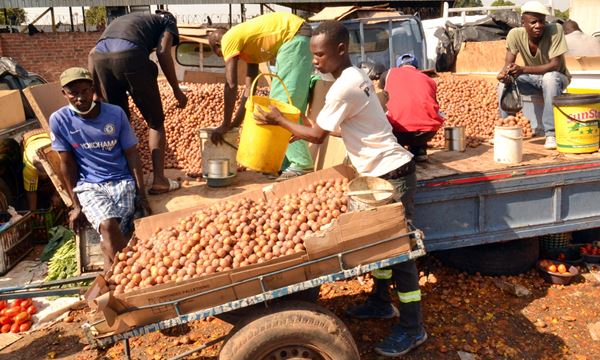Food systems are broader than value chains – thanks to African mass markets
While there is a tendency for policy makers to conflate food systems with value chains, mass food markets reveal how food systems are broader than value chains. That distinction is very important in clarifying and creating pathways for decolonizing food systems. Putting African mass food markets at the center of food systems demonstrates how food systems and mass food markets are not mutually exclusive.

A food systems lens sees beyond colonial value chains like maize and wheat. In fact, a food systems analysis can be considered an alternative to the traditional value chain analysis which tends to be colonial in how food is examined sequentially in ways that mimic a chain of activities for an individual crop or commodity. This misses the point that crops or commodities do not exist in isolation. For instance, analyzing the maize value chain without examining the entire ecosystems of commodities in which maize is just one component misses many critical dynamics.
How food systems reveal more benefits than value chains
When properly analyzed, food systems bring to light several non-marketable values and several ways of generating value that remain hidden under conventional value chain approaches. Such invisible values without a market price include food safety as public good. Millions of African smallholder farmers are always dealing with negative consequences of bad production practices driven from outside. Such negative externalities are often better handled by local values.
African mass food markets demonstrate how a food systems approach may not be perfect but it generates diverse values for people including decent livelihoods, dignified jobs, opportunities to flourish and values for preserving nature or biodiversity by averting soil depletion and biodiversity loss. This is where farmers practicing agroecology lead by example by recognizing that food systems consider several parts of the entire system. For instance, the market box cannot be examined in isolation without examining the nutrition box including food safety issues.
Decolonizing food systems presents a great opportunity to understand avenues through which diverse foods intersect and relate as well as addressing inequalities between commodities. For example, because wheat does not grow in all natural regions of a particular country, when policy makers devote more resources to wheat, such measures are at the expense of commodities which do not grow in winter and communities where wheat does not grow naturally. Why should a single commodity consume a big chunk of the national budget when other commodities like small grains or sweet potatoes that lift more people out of poverty are not equally financed?
Elements of a winning value proposition for African mass food markets
Value chain economists often struggle to make sense of dynamic food systems like African mass food markets. A winning value proposition for food systems driven by African mass food markets can have the following elements:
- Efforts to promote food systems through the recognition and protection of local mass food markets should start by engaging key stakeholders and increasing their awareness to socio-economic fortunes within their community. For instance, most local authorities have not done an exercise to really understand what can drive their districts especially using agriculture and food systems. This can be through mapping commodities and rating level of contribution to local socio-economic development. Critical details include what is being produced for own consumption? What is produced in surplus for local livelihoods and the extent to which the surplus generates income. What are the major sources of income for local people?
- What is also required is an in-depth assessment of production capacity in line with land use patterns taking into account factors like lack of draught power, labor or lack of manpower. This can build a case for the introduction of labor-serving technologies, especially given that most farmers are now aging to continue doing manual labor associated with agriculture and food systems.
- The state of soils in most African farming communities need urgent national attention. Decision makers cannot continue letting farmers grow crops with no soil tests to inform production against soils. Key questions include what can be done to improve local soils? Several farmers have moved from producing crops without fertilizer, then to manure and then back conventional fertilizer using their own common sense and wisdom.
- Agricultural extension models need to be revisited in line with a changing climate. Extension officers should also be mandated to control the rampant proliferation of seed varieties pushed by seed companies. Farmers are realizing that some varieties sold in shops are performing below expectation and being replaced by local varieties. This calls for a very strong monitoring, reporting and accountability system among extension officers to a point where they can recommend banning of some seed varieties like what happens to chemicals.
Toward a holistic approach to food systems
A comprehensive understanding of agriculture-driven economies requires a holistic approach to food systems as opposed to value chain approach. However, local communities often lack capacity to package what they are doing for purposes of attracting investors. They can tell you everything they are doing and mention all the solutions but it is not written down and packaged properly. Community investment models that should be an integral component of local food systems are often lacking due to absence of external support that should assist in developing action plans – what actions can communities collaborate around as opposed to individual farmer enterprises? Farmers are facing challenges in organizing and coordinating their production – what can be done at community levels? If poor work space is affecting local traders, what can be done to solve the situation?
charles@knowledgetransafrica.com / charles@emkambo.co.zw /
info@knowledgetransafrica.com
Website: www.emkambo.co.zw / www.knowledgetransafrica.com
Mobile: 0772 137 717/ 0774 430 309/ 0712 737 430
